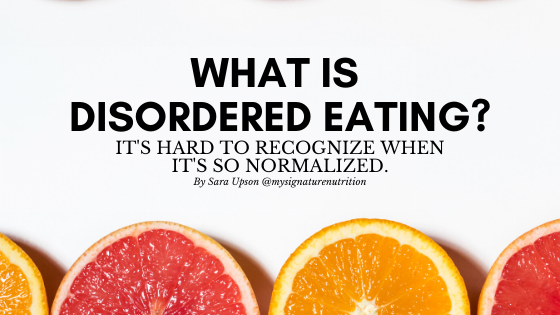What is disordered eating?
February 10th, 2020 by Sara Upson

Whenever I talk about diet culture I almost always talk about disordered eating. Why? Because diet culture is disordered eating so whenever I’m talking about diet culture, I’m also talking about disordered eating.
Disordered eating has become so normalized; it’s sometimes hard to distinguish what it is. While it might be easy to imagine what disordered eating is, it’s also this gray area that isn’t really defined. And because it’s so normalized in our culture- it makes it even harder to see the behaviors as being disordered. In fact, it’s so common your brain just filters past it as if it’s no big deal.

So what is disordered eating?
Disordered eating is a descriptive phrase to describe behaviors around food and includes a wide range of abnormal eating and weight behaviors. To be clear, it’s not an eating disorder diagnosis.
Disordered eating occurs on a spectrum. People with disordered eating may or may not have an eating disorder, but people with an eating disorder will have disordered eating. You could say disordered eating can vary from dieting or restrictive eating all the way to a full-blown eating disorder diagnosis.

Disordered eating includes
- chronic dieting, yoyo dieting
- skipping meals
- frequent weight fluctuations
- rigid eating patterns related to types of food/ food groups, meal times, or places to eat (won’t eat at a restaurant or if someone else has prepared the food)
- fear or anxiety around specific foods
- feeling out of control with food
- excessive or rigid exercise patterns
- feelings of guilt and shame when unable to maintain food or exercise plan
- feeling like you need to make up for eating
- avoiding social situations because of food
- compensating for food eaten (in any form)
- obsessing over food- counting calories, ingredients, macros, points, quality, etc.

Disordered eating is not an eating disorder, but could be an early warning sign. In several studies ranging from 1 to 4 years, 30-45% of those with disordered eating progressed to a full blown eating disorder. And while the majority will not progress to a diagnosed eating disorder, it doesn’t mean that disordered eating is innocent.
Disordered eating is harmful and can interfere with quality of life. It impacts health, both physically and mentally. It leads to weight fluctuations, eating disorders, GI problems, anxiety, depression, social isolation, bone loss, slowed metabolism, feeling cold, decreased heart rate and blood pressure.

There’s a powerful social element to diet culture and disordered eating. Because disordered eating is so common- many people don’t realize just how harmful it is and believe it’s what everyone does. More than that, it’s bonding, what people do when they get together (talk about food and diets), the topic of so many conversations. Sadly, it’s become so normalized.
Diet culture celebrates disordered eating. Even worse than that, diet culture applauds disordered eating behaviors. When you engage in disordered eating, you’re likely applauded, celebrated, or receive praise for what a “good” job you’ve done- even though the behaviors are really subclinical eating disorders. I can’t think of another illness that’s celebrated in its inception, encouraged or reinforced.

Because it’s so normalized and celebrated it’s hard to see the behaviors as abnormal, concerning, or worthy of support. While they might not be abnormsl (just per the culture) they are concerning, and worthy of support- no matter what.
Disordered eating and diet culture make it hard to recognize eating disorders. When everyone around you engages in the same disordered, but normalized, eating behaviors or thoughts around food- it’s hard to recognize behaviors as problematic. When everyone around you praises you (or others) for engaging in disordered eating, it’s even harder to recognize disordered eating as a problem. It lays the gorund work to promote eating disorders and makes it hard to recognize early warning signs or even a full-blown eating disorder.

So what can you do? Become familiar with disordered eating, diet culture, and eating disorders. Bring attention to behaviors or comments when you see or hear them. If you’re comfortable, ask others around you not to engage in disordered eating behaviors or engage in talk about them either. Let them know how it’s harmful, how it impacts you, and how you’re trying to live your life differently.
As we, as a culture, become more familiar with disordered eating and diet culture- then we can help bring awareness to eating disorders and help people get access to care. The incidence of eating disorders has been on the rise across all ages, genders, races, socioeconomic status around the world. I can only imagine that until we begin to separate from diet culture and disordered eating to create a new norm based on intuitive eating or an anti-diet approach then this trend will only continue to rise.
If you’d like to assess your level of disordered eating, here’s a free online quiz.
Comments are closed.





